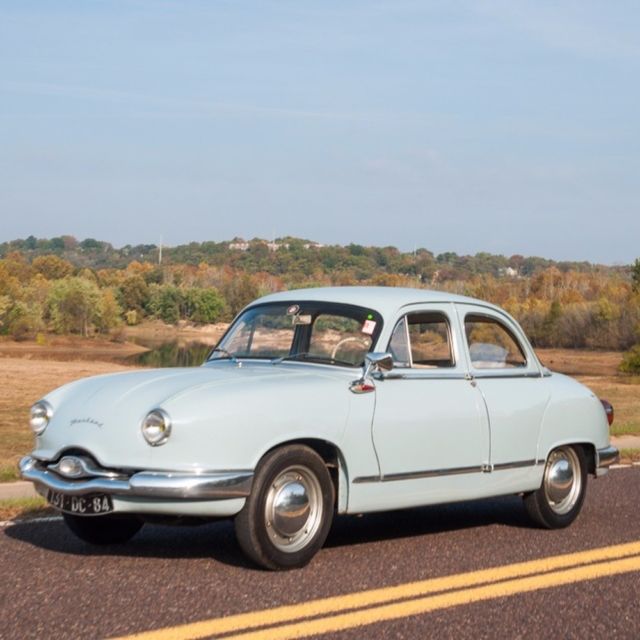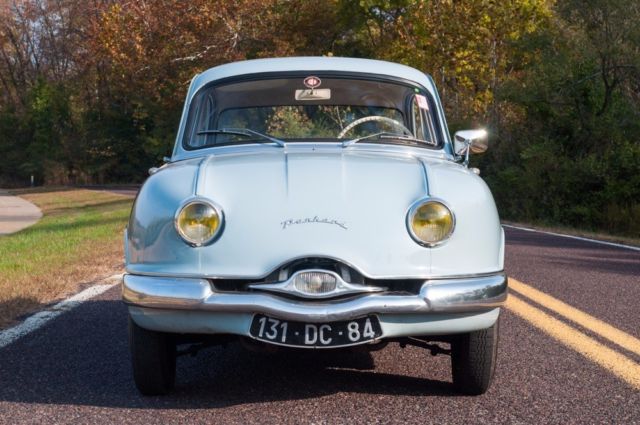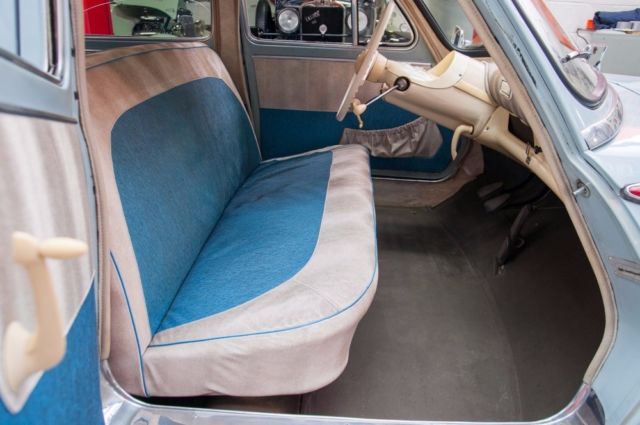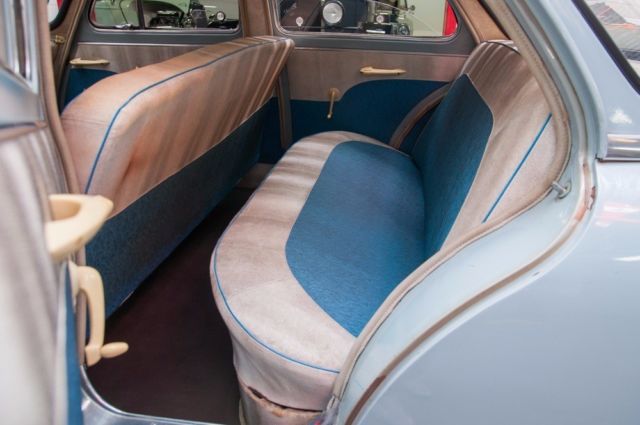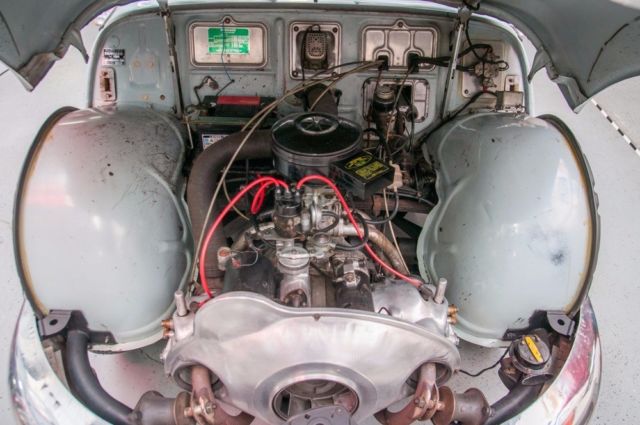1957 Panhard Dyna Z
- Make: Other Makes
- Model: G80
- SubModel: Panhard Dyna Z
- Type: Sedan
- Trim: Panhard Dyna Z
- Year: 1957
- Mileage: 24,076
- VIN: 1038497
- Color: Light Blue
- Engine size: .9L flat two-cylinder
- Number of cylinders: 2
- Transmission: Four-speed Manual
- Drive type: RWD
- Interior color: Blue and White
- Vehicle Title: Clear
- Location: Saint Louis, Missouri, United States
Description
1957 Panhard Dyna Z Description1957 Panhard Dyna Z
Aluminum body construction (last year for the aluminum) 850cc flat air-cooled, two-cylinder engine 42HP Four-speed column-mounted manual transmission Light blue exterior with blue and white interior Front-wheel drive and four-wheel drum brakes Center-mounted foglight Previously part of the famous Blackhawk Collection Rare US Market car distributed by French Motors in LA CaliforniaThe French have always been known for doing things differently; for asking why not when others ask why and MotoeXotica Classic Cars has a rolling example of this thought process with a rarely seen 1957 Panhard Dyna Z.
The car’s paint and trim are in overall very good order. The windows are clear and crack-free while the lights, including the center-mounted foglight, are haze-free and in one piece. This car rides on Michelin 145R40 tires surrounding 16-inch steel wheels with full moon wheel covers.
The car’s aluminum bodywork is solid and straight, the trunk is in good order with a full-sized spare tire, the engine bay is tidy and the bumpers fit well to the car’s body overall.
Under the car’s clamshell hood is a .9L, flat, air-cooled, two-cylinder engine. It featured a concentric torsion bar valve springs on roller bearings, hollow aluminum push rods with hardened steel tips, roller main bearings and big end rod bearings of “Panhard Patent” design with an additional set of smaller rollers carrying the roller cage (separator); non-removable cylinder heads, removable steel cylinder liners. The cylinder “jugs” pulled off the crankcase and pistons like those of Volkswagen air-cooled engines. Soft engine mounts to smooth the engine’s roughness, a radial flow fan bolted to crankshaft, full cooling shroud, aluminum structure and cooling fins. Herringbone timing gears, steel pinion and a “Celcon” phenolic gear running with slight interference fit, permissible due to the flexibility of the Celcon.
The 850cc engine is connected to a cable-operated four-speed manual cast aluminum case transaxle with second and third synchromesh, transfer gears and second, third and fourth of “herringbone” design with a column shift. Unlike most front-wheel drive inline engine transaxles, the Panhard gearbox is between the engine and the final drive. The final drive spiral bevel gear is on a primary shaft, then a step-down to differential gear through helical (not herringbone) pinion and gear. The drive shafts concentric tubes with rubber in the space between the inner and outer tubes and cardan (“universal”) joint at the inner end next to the transaxle, double cardan constant velocity joint at the outer end at the wheel. The car stops via four-wheel drum brakes.
Inside, the original blue and white bench seats that can hold six average-sized people are in overall good shape but show some wear from age. The benefit of front-wheel drive is obvious in the car’s roomy interior, no center hump needed for a driveshaft as on a rear-drive vehicle. The carpet is fair while the headliner is in good overall condition but has some blemishes. The car’s futuristic instrument panel is in good order, as is the two-spoke steering wheel. The car’s shift lever is column-mounted, eliminating the need for a floor-mounted shifter and free space for a front center passenger. The inner door panels, mirror glass and shift lever are in good shape. There is a blemish on the passenger side between the doors.
In 1955, Citroën had taken a 25 percent holding in Panhard’s automobile business and during the next two years the national dealership networks of the two businesses were integrated. This gave Citroen and Panhard dealers expanded market coverage, incorporating now a small car, a medium-sized saloon and a large car range. It gave the Panhard Dyna Z, during its final years in production, a level of market access that its predecessor had never enjoyed and sales benefitted.
The more streamlined Dyna Z replaced the Dyna X in 1954. Like its predecessors, the Dyna X and the Panhard Dynavia concept that influenced its design, the Dyna Z’s body was originally aluminum with steel tube subframes front and rear joined by steel plate reinforcements in the sills. The decision to use aluminum sheeting for car bodies had been taken at a time when a sudden drop-off in demand for fighter planes had left the producers with a glut of the metal but in subsequent years the relative cost advantage of sheet steel had increased steadily. In summer 1954, the cost penalty of persisting with aluminum bodywork had become financially insupportable and in fall 1955 the latest Dyna Type “Z1” had steel bodywork (doors, trunk and hood were still in aluminum though).
This car is currently located at our facility in St. Louis, Missouri. Current mileage on the odometer shows 38,746 kilometers or 24,076 miles. It is sold as is, where is, on a clean and clear, mileage exempt title. GET OUT AND DRIVE!!!
Click here for our YouTube video!
VIN: 1038497
Note: Please see full terms and conditions listed below that pertain to the purchase of any said vehicle, thank you.
Aluminum body construction (last year for the aluminum) 850cc flat air-cooled, two-cylinder engine 42HP Four-speed column-mounted manual transmission Light blue exterior with blue and white interior Front-wheel drive and four-wheel drum brakes Center-mounted foglight Previously part of the famous Blackhawk Collection Rare US Market car distributed by French Motors in LA CaliforniaThe French have always been known for doing things differently; for asking why not when others ask why and MotoeXotica Classic Cars has a rolling example of this thought process with a rarely seen 1957 Panhard Dyna Z.
The car’s paint and trim are in overall very good order. The windows are clear and crack-free while the lights, including the center-mounted foglight, are haze-free and in one piece. This car rides on Michelin 145R40 tires surrounding 16-inch steel wheels with full moon wheel covers.
The car’s aluminum bodywork is solid and straight, the trunk is in good order with a full-sized spare tire, the engine bay is tidy and the bumpers fit well to the car’s body overall.
Under the car’s clamshell hood is a .9L, flat, air-cooled, two-cylinder engine. It featured a concentric torsion bar valve springs on roller bearings, hollow aluminum push rods with hardened steel tips, roller main bearings and big end rod bearings of “Panhard Patent” design with an additional set of smaller rollers carrying the roller cage (separator); non-removable cylinder heads, removable steel cylinder liners. The cylinder “jugs” pulled off the crankcase and pistons like those of Volkswagen air-cooled engines. Soft engine mounts to smooth the engine’s roughness, a radial flow fan bolted to crankshaft, full cooling shroud, aluminum structure and cooling fins. Herringbone timing gears, steel pinion and a “Celcon” phenolic gear running with slight interference fit, permissible due to the flexibility of the Celcon.
The 850cc engine is connected to a cable-operated four-speed manual cast aluminum case transaxle with second and third synchromesh, transfer gears and second, third and fourth of “herringbone” design with a column shift. Unlike most front-wheel drive inline engine transaxles, the Panhard gearbox is between the engine and the final drive. The final drive spiral bevel gear is on a primary shaft, then a step-down to differential gear through helical (not herringbone) pinion and gear. The drive shafts concentric tubes with rubber in the space between the inner and outer tubes and cardan (“universal”) joint at the inner end next to the transaxle, double cardan constant velocity joint at the outer end at the wheel. The car stops via four-wheel drum brakes.
Inside, the original blue and white bench seats that can hold six average-sized people are in overall good shape but show some wear from age. The benefit of front-wheel drive is obvious in the car’s roomy interior, no center hump needed for a driveshaft as on a rear-drive vehicle. The carpet is fair while the headliner is in good overall condition but has some blemishes. The car’s futuristic instrument panel is in good order, as is the two-spoke steering wheel. The car’s shift lever is column-mounted, eliminating the need for a floor-mounted shifter and free space for a front center passenger. The inner door panels, mirror glass and shift lever are in good shape. There is a blemish on the passenger side between the doors.
In 1955, Citroën had taken a 25 percent holding in Panhard’s automobile business and during the next two years the national dealership networks of the two businesses were integrated. This gave Citroen and Panhard dealers expanded market coverage, incorporating now a small car, a medium-sized saloon and a large car range. It gave the Panhard Dyna Z, during its final years in production, a level of market access that its predecessor had never enjoyed and sales benefitted.
The more streamlined Dyna Z replaced the Dyna X in 1954. Like its predecessors, the Dyna X and the Panhard Dynavia concept that influenced its design, the Dyna Z’s body was originally aluminum with steel tube subframes front and rear joined by steel plate reinforcements in the sills. The decision to use aluminum sheeting for car bodies had been taken at a time when a sudden drop-off in demand for fighter planes had left the producers with a glut of the metal but in subsequent years the relative cost advantage of sheet steel had increased steadily. In summer 1954, the cost penalty of persisting with aluminum bodywork had become financially insupportable and in fall 1955 the latest Dyna Type “Z1” had steel bodywork (doors, trunk and hood were still in aluminum though).
This car is currently located at our facility in St. Louis, Missouri. Current mileage on the odometer shows 38,746 kilometers or 24,076 miles. It is sold as is, where is, on a clean and clear, mileage exempt title. GET OUT AND DRIVE!!!
Click here for our YouTube video!
VIN: 1038497
Note: Please see full terms and conditions listed below that pertain to the purchase of any said vehicle, thank you.
 1957 Panhard Dyna Z, Check our 120 Photos and Video...LOOK
1957 Panhard Dyna Z, Check our 120 Photos and Video...LOOK
Mileage: 24,076
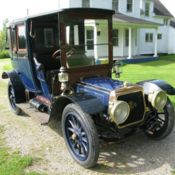 1910 Panhard-Levassor brass era automobile
1910 Panhard-Levassor brass era automobile
Mileage: 9,999,999
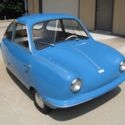 1957 FULDAMOBIL S-7
1957 FULDAMOBIL S-7
Mileage: 88,887
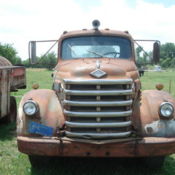 1957 Diamond T Must See
1957 Diamond T Must See
Mileage: 100,000
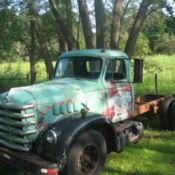 1957 Diamond T
1957 Diamond T
Mileage: 100,000
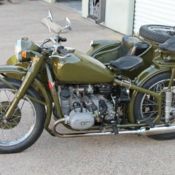 1957 CJ-750 motorcycle
1957 CJ-750 motorcycle
Mileage: 7,500
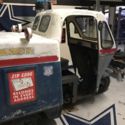 1957 Postal Vehicle
1957 Postal Vehicle
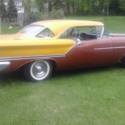 1957 Oldsmobile 88 two door
1957 Oldsmobile 88 two door
 1957 LaDawri Conquest
1957 LaDawri Conquest
Mileage: 999,999
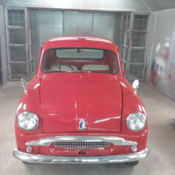 1957 Standard Ten Truck
1957 Standard Ten Truck
Mileage: 99,999
